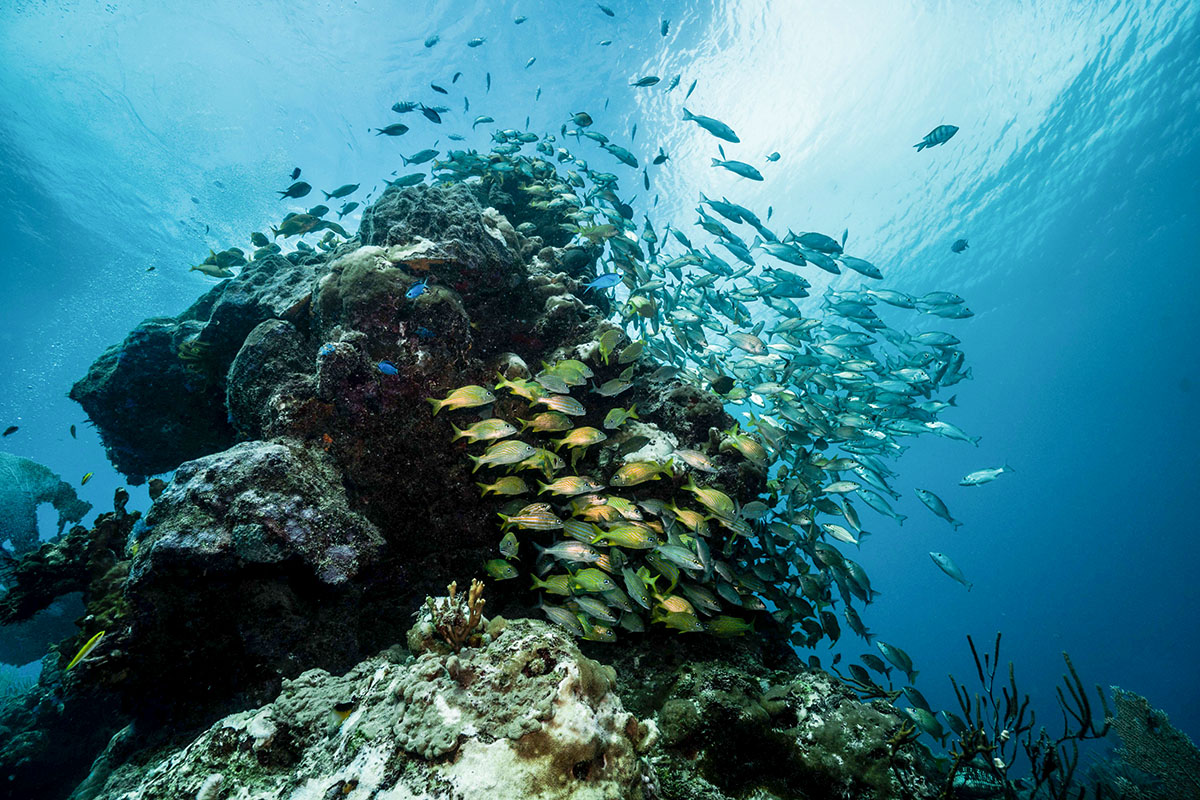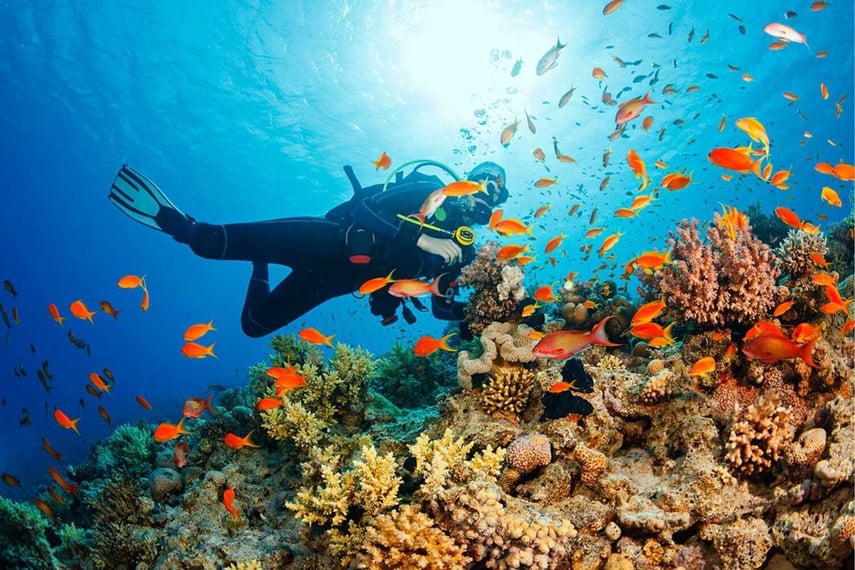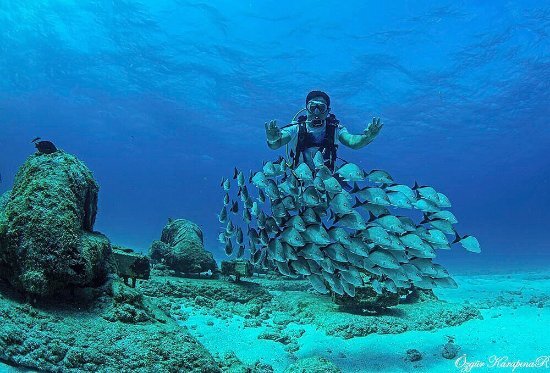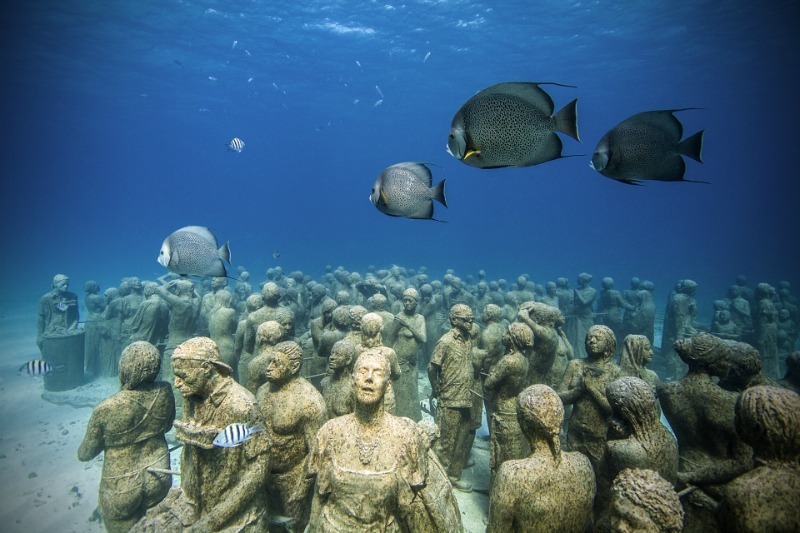Cancun Reefs: The Marine Ecosystems You Must Discover

Explore Cancun stunning reefs, their diverse marine ecosystems, and learn how to visit them while contributing to their conservation.
Explore this information with AI
Cancun, located in the state of Quintana Roo, Mexico, is world-renowned for its stunning white-sand beaches and turquoise waters. However, beneath the surface lies an even greater treasure: its vibrant coral reefs. These underwater ecosystems are not only a spectacular display of biodiversity but also play a crucial role in ocean health and coastal protection.
Marine Wealth of Cancun
The marine richness of Cancun is exceptional, as it forms part of the Mesoamerican Barrier Reef System (MBRS), the second-largest coral reef in the world. This ecosystem is home to over 500 species of fish, 350 species of mollusks, and 400 species of coral. In addition to coral reefs, the region also features mangroves and seagrass beds that serve as nurseries and shelters for numerous species, including sea turtles, manatees, and various birds. This biodiversity is not only vital for ecological balance but also supports the local economy through tourism and fishing.
What Is a Reef and Why Is It Important?
A coral reef is an underwater structure built by colonies of small marine animals called coral polyps. These polyps secrete calcium carbonate, which accumulates over time to form the rocky structures we know as reefs. Although reefs cover less than 0.1% of the ocean floor, they are the most biodiverse marine ecosystem in the world, hosting approximately 25% of all known marine species.
The importance of coral reefs lies in several key aspects:
- Biodiversity: Underwater cities that provide food, shelter, and breeding grounds for thousands of species.
- Coastal protection: Natural barriers that reduce wave energy, protecting coasts from erosion, hurricanes, and tsunamis.
- Economy and tourism: Major attractions for snorkeling, diving, and sport fishing that generate significant income for coastal communities.
- Science and medicine: Valuable for research, with many reef species serving as sources of compounds with medical potential.
Popular Reefs in Cancun
Punta Nizuc

Located at the southern tip of Cancun’s Hotel Zone, near Nichupté Lagoon, Punta Nizuc is part of the Costa Occidental de Isla Mujeres, Punta Cancun, and Punta Nizuc National Park.
- Shallow, crystal-clear waters ideal for snorkeling.
- Hosts part of the Underwater Museum of Art (MUSA), including Jason deCaires Taylor’s sculpture The Gardener of Hope.
- Home to hawksbill turtles, angelfish, parrotfish, barracudas, green moray eels, spiny lobsters, blue tangs, and diverse corals.
- Excellent visibility and a striking turquoise sea.
El Meco Reef

Located north of Cancun near Puerto Juárez, El Meco is shallow (2.5 to 4 meters deep), making it great for snorkeling.
- Part of the Great Maya Reef, with calm and warm waters.
- Rich in tropical fish, rays, barracudas, turtles, and both hard and soft corals.
- Artificial reef structures recently added to promote marine recovery.
MUSA (Museo Subacuático de Arte/ Underwater Museum of Art)

Spread across Cancun, Isla Mujeres, and Punta Nizuc, MUSA features over 500 life-sized sculptures submerged to serve as artificial reefs.
- Main galleries: Manchones (near Isla Mujeres) and Nizuc (at Punta Nizuc).
- Supports coral growth and reduces stress on natural reefs.
- Snorkeling and diving allow visitors to swim among sculptures and marine life.
- A surreal fusion of art and nature where sculptures are colonized by colorful marine organisms.
Punta Cancun

Located at the northern tip of Cancun’s Hotel Zone, also part of the National Park.
- Rich in seagrasses, algae, hard and soft corals.
- Habitat for turtles, manatees, and diverse fish.
- Natural protection from the reef creates calm waters, almost like a natural pool.
Other Reefs and Protected Areas
- Manchones Reef: Located 14 km off Cancun, near Isla Mujeres, about 10 meters deep. Popular for scuba diving and part of MUSA.
- Puerto Morelos Reef National Park: South of Cancun, one of the best-preserved reefs in the region, ideal for snorkeling and diving.
- El Farito Reef: A small reef and lighthouse near Isla Mujeres, perfect for snorkeling.

How to Visit the Reefs in Cancun
Visiting Cancun’s reefs is an unforgettable experience. Options include:
- Snorkel and diving tours: Most common way, with equipment, guides, and transport included. Many tours combine reefs with cultural or wildlife activities.
- Direct access: Some reefs, like Punta Nizuc, are accessible from the beach or small boats. MUSA requires specialized tours.
- Glass-bottom boat tours: Perfect for those who prefer not to swim.
Protecting Cancun’s Reefs
Cancun’s reefs are fragile and protected under strict regulations. Many are within Protected Natural Areas, such as the National Parks of Isla Mujeres, Punta Cancun, Punta Nizuc, and Puerto Morelos.
Key conservation measures include:
- Reef and dock fees: Visitor fees fund reef protection and maintenance.
- Boat regulations: Limits on anchoring and boat numbers to prevent coral damage.
- No touching or collecting: Strict prohibition on disturbing marine life or corals.
- Biodegradable sunscreen: Required to avoid contaminating the waters.
- Restoration programs: Coral transplantation and artificial reef projects like MUSA.





